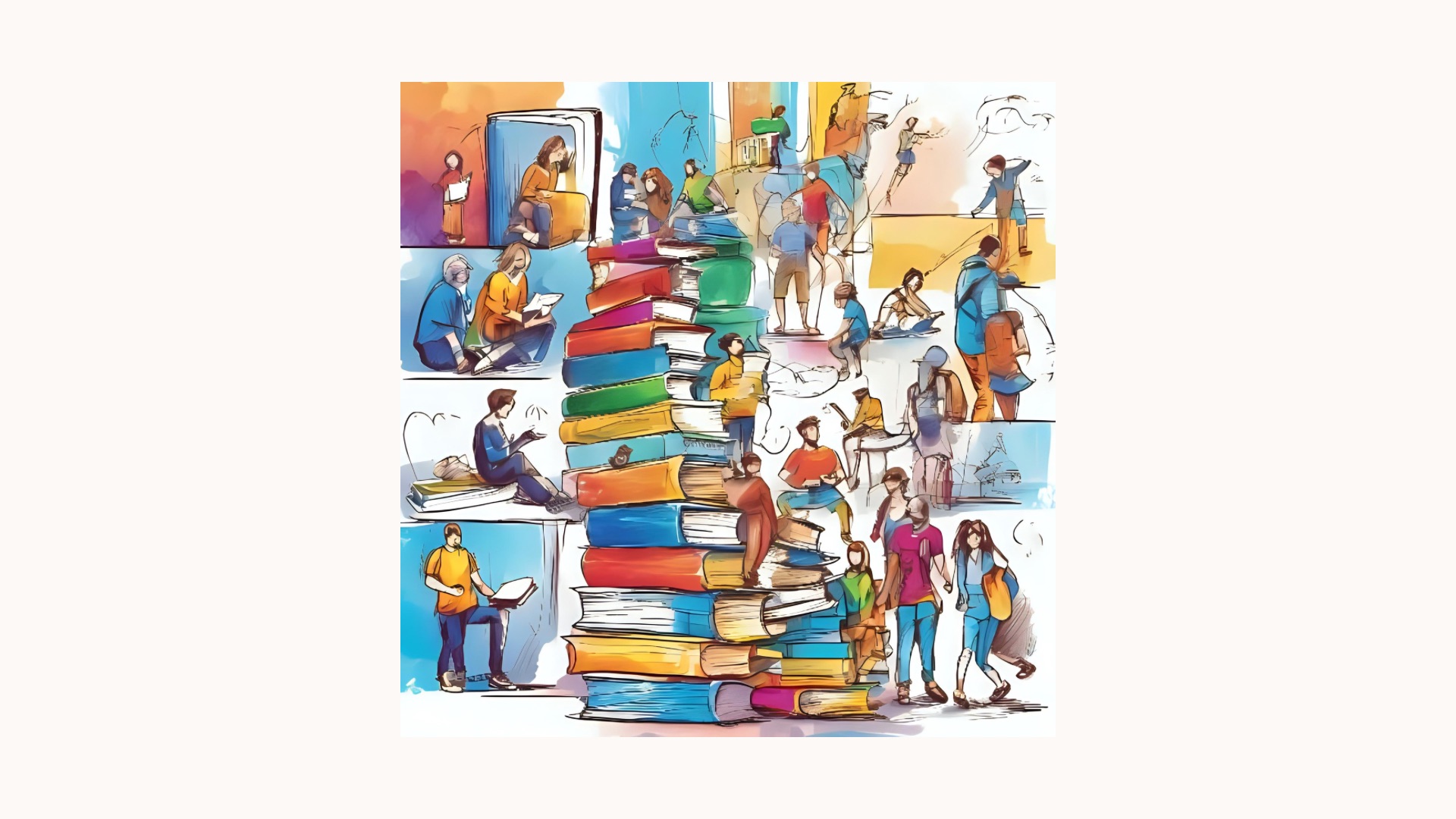Stories Bring Us Together
Stories sit at the core of what it means to be human. They shape our sense of self, deepen our understanding of others, and help us navigate the world — its joys, struggles, surprises, and contradictions. From bedtime read-alouds to podcasts on the bus, from family memories to quick anecdotes traded over tea or coffee (maybe even wine), storytelling connects us across ages, cultures, and experiences.
Libraries have always understood this. For generations, they’ve offered spaces where we can step into another person’s life simply by opening a book. But today, libraries are more than guardians of stories — they’re places where stories are created, shared, and celebrated.
In many ways, the library isn’t just a home for stories. It’s a home for us.

From Stacks to Story Studios
A great example is the DOK Library in Delft, Netherlands. Its mission extends far beyond lending books. Through multimedia exhibits, community-driven archives, and interactive installations, visitors are encouraged to contribute their own experiences. Instead of receiving information passively, people help build an evolving portrait of their community.
This reminds us that libraries aren’t immovable institutions. They’re vibrant, collaborative spaces where everyone plays a part in shaping the narrative.
This same spirit is reflected in projects like StoryCorps, which works with public libraries across the United States to help people record meaningful conversations (Eberhart, 2018). These personal reflections become part of a broader cultural memory. For students, listening to or recording stories like these can be powerful. It’s not just communication practice; it’s a chance to build curiosity and empathy. It also ties directly to information literacy: understanding people and their contexts — not just locating facts.
Borrowing People, Not Just Books
Another compelling example is the Human Library project. Instead of borrowing a book, visitors “borrow” a person willing to share their lived experience in a one-on-one conversation. Participants might meet someone who has faced homelessness, recently immigrated, or simply sees the world from a very different angle. The goal is to encourage understanding by fostering genuine dialogue rather than assumptions.
Writers who have studied the Human Library note that it helps communities learn about themselves in meaningful ways (Wentz, 2013). Research also suggests that participants often leave with a stronger sense of empathy, especially toward those whose perspectives are underrepresented or misunderstood (Aarne-Skidmore, 2021).
Imagine bringing this idea into a school library — a dedicated day where students can sit down with elders, newcomers, or classmates whose stories they may never have heard otherwise. Educators describe these as moments of courageous conversation, where the simple act of listening becomes a bridge between people (Ray, 2019).
Storytelling in the School Library
School libraries are uniquely positioned to cultivate this culture of storytelling and attentive listening. Equipped with digital tools and creative spaces, students can become storytellers themselves — through podcasts, videos, zines, or projects inspired by initiatives like The Library’s Listening Lab (Mairn & Terrana, 2022). Along the way, they learn to share their own stories while respecting and valuing the stories of others.
This aligns with what scholars call narrative inquiry: reflecting on and exchanging stories to better understand who we are, where we come from, and where we’re headed (Stephens, 2020). It’s a skill that follows students well beyond school, nurturing empathy, perspective-taking, and community connection.
Creating this kind of culture means ensuring that every voice feels welcome. As Paxaman (2019) notes, libraries remain vital precisely because they respond to evolving community needs — and right now, people deeply need spaces where they can feel heard. That might take the form of story circles, inclusive collections, or collaborative projects that highlight a wide range of experiences.
Each time we make room for someone’s story, we’re reinforcing that their voice matters.

Why It Matters
At their foundation, libraries are about connection. They connect people to information, of course, but also to ideas, experiences, and one another. When librarians embrace the role of story facilitator, something truly meaningful happens: the library becomes not just a learning environment, but a place where people feel they belong.
Imagine a student recording their first podcast, a Human Library conversation where a hesitant teenager asks a heartfelt question, or someone sharing the history of where they come from. Each of these moments builds a bridge — created through openness, curiosity, and the willingness to truly listen.
Ultimately, stories remind us we’re all part of a larger tapestry. Everyone who walks into a library carries a story worth hearing. And when those stories come together, they help create the kind of community that grows from empathy, imagination, and connection.
At their best, libraries are where connections spark every day — where the human story continues, one voice, one listener, and one shared moment at a time.
____________________
References
Aarne-Skidmore, E. (2021). New study on the impact of the Human Library. Human Library. https://humanlibrary.org/new-study-on-the-impact-of-the-human-library/
Eberhart, G. M. (2018, February 10). Sharing people’s stories: StoryCorps partners with public libraries. American Libraries Magazine. https://americanlibrariesmagazine.org/blogs/the-scoop/sharing-peoples-stories/
Mairn, C., & Terrana, J. (2022). A library’s listening lab. INFO287 – The Hyperlinked Library. https://287.hyperlib.sjsu.edu/wp-content/uploads/2022/06/MairnListeningLab.pdf
Paxaman, M. (2019). Challenged but not dying, the public libraries are more relevant than ever. Jutland Station. https://www.dropbox.com/scl/fi/dd3t7to32e7ky5mqduns6/Challenged-but-not-dying-the-public-libraries-are-more-relevant-than-ever-Jutland-Station.pdf?rlkey=6bppru4ffp80pakifb0mh2wo2&dl=0
Ray, M. (2019). Courageous conversations at the Human Library. Next Avenue. https://www.nextavenue.org/courageous-conversations-human-library/
Stephens, M. (2020, April 9). Office hours: Narrative inquiry. Tame the Web. https://tametheweb.com/2020/04/09/office-hours-narrative-inquiry/
Wentz, E. (2013, April 26). The Human Library: Sharing the community with itself. Public Libraries Online. https://publiclibrariesonline.org/2013/04/human_librar/
*images created by author in Canva

